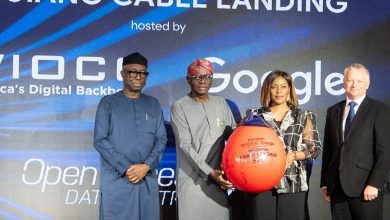China-Nigeria digital engagement improves in Africa


Mr. Chu Maoming, Consul General of the Chinese Consulate in Lagos, made the appeal for increased collaboration between China and Nigeria in the field of digital economy. He stated that such collaboration will assist in tackling the difficulties that are now being faced by the country.
Maoming stated that Nigeria is one of the most important economies in Africa and that Lagos is the economic, financial, and technological centre of Nigeria while he was speaking in Lagos at the 2022 Africa-China Economic Partnership Agenda Conference, ACEPAC, summit that was organised by the Afri-China Media Centre, publisher of Africa China Economy Magazine. Maoming said that Nigeria is one of the most important economies in Africa and that Lagos is the economic, financial, and technological centre of Nigeria.


He revealed that China and Nigeria have the greatest economies in Asia and Africa, respectively, and that both nations are making remarkable progress in the development of their digital economies. China is the largest economy in Asia, and Nigeria has the largest economy in Africa. He pointed out that the collaboration between the two nations is primarily concentrated on the construction of a 5G network, the development of a mobile payment sector, and the creation of an e-commerce platform.
According to the data provided by the Nigerian Communications Commission, the number of mobile internet users in Nigeria has surpassed 150 million as of June 2022, with an internet penetration rate of nearly 70 percent. He said this information was obtained from the Nigerian Communications Commission. This demonstrates the potential of information and communications technology to contribute to the growth of a nation’s economy.
Prof. Eghosa Osaghae, Director General of the Nigerian Institute of International Affairs (NIIA), offered his perspective, explaining that Nigeria is prepared to take advantage of the opportunities that the digital economy offers on a more extensive scale.
He mentioned that the Institute had an important part to play in the process of formulating policies for the government, and he gave his assurance that Nigeria is prepared based on the laws that enable it.
In addition to this, he went into detail about the contributions that the digital economy sector had made to the projects and businesses of the institute, highlighting how these contributions had made it possible for the institute to handle an increased number of opportunities for workforce development, as well as training and conference participation.
Also, the Executive Director of Afri-China Media, Ikenna Emewu, termed the conference as a landmark that would indicate the expansion of the digital economy sector in Nigeria. He said that the conference would take place in Nigeria.
According to Emewu, Nigeria and the rest of Africa cannot allow themselves to fall behind in the adoption of digital potential to enhance their economies.


It was very important to develop China’s partnership, he added, because digitalization has taken over the world in all aspects, and young Nigerian ICT start-ups have led the way in the direction of digitization on the African continent.
Already China has since deployed the technology for a 5G network; they are into big data, cloud computing, the manufacture of hardware, the laying of fiberoptic cable, artificial intelligence (AI), and the internet of things (IoT), so a partnership with the country will only result in positive outcomes.
Five different specialists each presented a paper that was related to the summit’s overarching theme, which was “Partnering with China to build Africa’s digital economy.” Everything that has to do with the digital economies of China and Africa. They are Professor Zhong Xin from the School of Journalism and Communication at Renmin University in Beijing; Dr. Efem Ubi, Director of Research at the National Institute of International Affairs (NIIA); Professor He Wenping from the China Academy of Social Sciences (CASS); Professor Yan Yan from the School of Journalism and Communication at Renmin University in Beijing; and Mr. Misty Uba, Chief Operating Officer of an engineering consulting firm.
The digital economy and the vital functions it plays were the sole subjects of three of the articles that were written by Ubi, Uba, and Yan. The first two discussed how Africa is impacted by the current state of affairs, as well as how changes may be made for the better.
Zhong did place an emphasis on the ways in which the media cooperation between China and Nigeria within the framework of the FOCAC has helped to the growth of the relationship between China and Africa.
She examined the cooperation between China and Africa in the post-Covid period, as well as the reasons why it needs to be further consolidated in a significantly larger number of areas than it was previously.
She told the story of how formerly unreachable rural areas in China have been rescued from a life of suffering and poverty via the use of the opportunities presented by the digital economy.
The two Nigerian experts, Ubi and Uba, investigated the degree to which China has participated in the digital economy in Nigeria and Africa, as well as the ways in which further value may be produced from a cooperation between the two countries.
In addition to this, they issued a plea to Chinese and Nigerian authorities, investors, and businesspeople to collaborate more closely in order to increase synergy in efforts to build the Nigerian end of the digital economy and bridge the digital gap.
Join our 100,000+ members and never miss our members’ exclusive Breaking News and Entertainment Gist.
Gain Access to Our Private News Room
Popular Stories right now
- ASUU to sue FG over Registration of CONUA, NAMDA
- Ex-Google ad executive creates tracker-free search engine
- Twitter shareholders support Elon Musk’s proposal.







